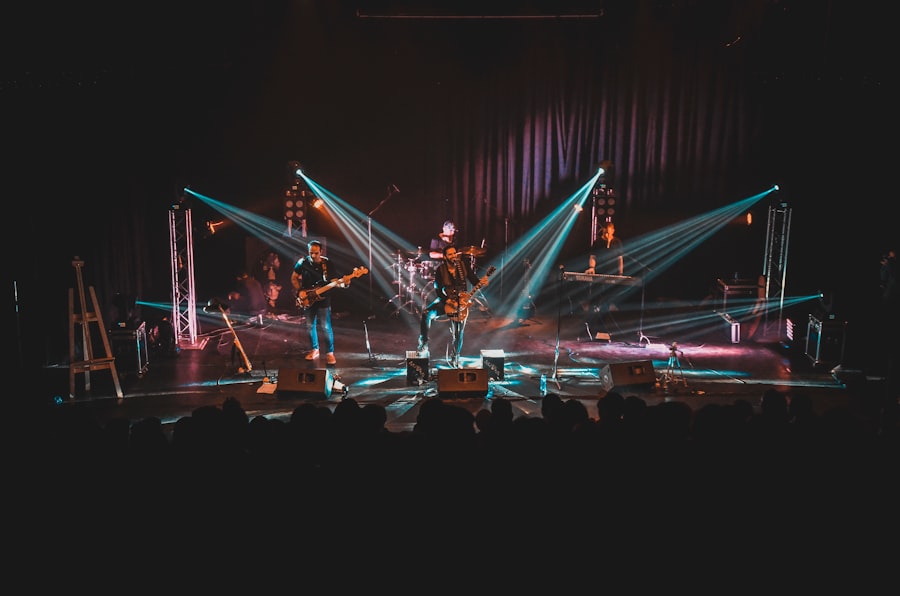A music promoter is a professional who is responsible for promoting and marketing musical events, concerts, and artists. They work to create awareness and generate interest in the music industry by organizing and publicizing events, securing venues, and coordinating with artists and their management teams. Music promoters play a crucial role in the success of musical events by using their skills in marketing, networking, and event planning to attract audiences and create memorable experiences for music fans.
Music promoters often work closely with artists, record labels, and venue owners to ensure that events are well-organized and well-attended. They may also be involved in negotiating contracts, securing sponsorships, and managing budgets for events. In addition to their promotional duties, music promoters may also be involved in booking talent, coordinating logistics, and overseeing the overall production of events. Overall, music promoters are essential in bringing music to the masses and creating opportunities for artists to showcase their talents.
A music promoter is someone who is passionate about music and has a deep understanding of the industry. They are skilled in marketing, event planning, and networking, and have a keen eye for talent. Music promoters are often outgoing and personable, with the ability to build relationships with artists, industry professionals, and music fans. They are also detail-oriented and organized, able to juggle multiple tasks and deadlines while staying focused on the big picture. Music promoters must be adaptable and able to think on their feet, as the music industry is fast-paced and constantly evolving. Overall, a successful music promoter is someone who is dedicated to bringing great music to the masses and creating memorable experiences for music fans.
Key Takeaways
- A music promoter is someone who helps to publicize and promote musical events, concerts, and artists.
- Skills and qualifications for music promoter jobs include strong communication, networking, and marketing skills, as well as a passion for music and knowledge of the music industry.
- Music promoters play a crucial role in the music industry by connecting artists with their audience, organizing events, and creating marketing strategies to promote music.
- Music marketing strategies for music promoters include social media promotion, event planning, and building relationships with industry professionals and media outlets.
- To land a music promoter job, individuals should gain experience through internships, networking, and building a strong portfolio of successful music promotion projects.
- Challenges of being a music promoter include intense competition, long hours, and the need to constantly adapt to changes in the industry, while rewards include the opportunity to work with talented artists and contribute to the success of music events.
- Future trends in music promotion may include increased use of digital marketing, virtual events, and the integration of technology to reach a wider audience.
Skills and Qualifications for Music Promoter Jobs
To be successful as a music promoter, there are several key skills and qualifications that are essential. Firstly, strong communication skills are crucial for building relationships with artists, industry professionals, and music fans. Music promoters must be able to effectively convey their ideas and plans to others, whether it’s negotiating contracts with artists or promoting events to the public. Additionally, creativity is important for developing unique marketing strategies and promotional campaigns that will capture the attention of potential attendees.
Furthermore, organizational skills are vital for managing the many moving parts of event planning and promotion. Music promoters must be able to juggle multiple tasks, stay on top of deadlines, and manage budgets effectively. Additionally, a deep understanding of the music industry and current trends is essential for staying ahead of the curve and knowing what will resonate with audiences. This includes knowledge of different musical genres, emerging artists, and popular trends in music marketing.
In terms of qualifications, a degree in marketing, communications, or music business can be beneficial for aspiring music promoters. However, practical experience in event planning, marketing, or artist management can also be valuable. Many successful music promoters have worked their way up through internships or entry-level positions in the industry, gaining hands-on experience and building a network of contacts along the way. Overall, a successful music promoter is someone who is passionate about music, has strong communication and organizational skills, and is knowledgeable about the industry and current trends.
The Role of Music Promoters in the Music Industry
Music promoters play a crucial role in the music industry by creating opportunities for artists to showcase their talents and connecting them with audiences. They are responsible for organizing and promoting live events such as concerts, festivals, and tours, as well as creating marketing strategies to generate interest and excitement around these events. Music promoters work closely with artists, record labels, venue owners, and sponsors to ensure that events are well-organized and well-attended.
In addition to event promotion, music promoters also play a key role in talent booking and artist management. They may be involved in negotiating contracts with artists and their management teams, securing performance agreements, and coordinating logistics for live performances. Music promoters also work to secure sponsorships and partnerships to help fund events and increase their reach. Overall, the role of a music promoter is multifaceted, involving elements of marketing, event planning, talent management, and networking.
Music promoters are essential in bringing music to the masses and creating opportunities for artists to connect with their fans. They help to create memorable experiences for audiences while also supporting the careers of artists by providing them with platforms to showcase their talents. Without the work of music promoters, many live events would not reach their full potential in terms of attendance and impact. Overall, music promoters are instrumental in shaping the live music landscape and contributing to the success of artists and events in the music industry.
Music Marketing Strategies for Music Promoters
| Marketing Strategy | Description |
|---|---|
| Social Media Promotion | Utilizing platforms like Instagram, Facebook, and Twitter to engage with fans and promote music releases and events. |
| Email Marketing | Sending out newsletters and updates to a mailing list to keep fans informed about upcoming shows, new music, and merchandise. |
| Collaborations | Partnering with other artists, influencers, or brands to expand reach and gain exposure to new audiences. |
| Live Performances | Organizing and promoting live shows and concerts to connect with fans and showcase music. |
| Content Creation | Creating engaging and shareable content such as music videos, behind-the-scenes footage, and interviews to build a strong online presence. |
Music promoters utilize a variety of marketing strategies to promote events and connect artists with audiences. One common strategy is social media marketing, which involves using platforms such as Facebook, Instagram, Twitter, and TikTok to create buzz around events and engage with potential attendees. Social media allows music promoters to share event details, artist announcements, behind-the-scenes content, and interactive promotions to build excitement leading up to an event.
Another effective marketing strategy for music promoters is influencer partnerships. By collaborating with popular influencers or bloggers in the music space, promoters can reach new audiences and leverage the influencer’s credibility to promote events. Influencers can help create buzz around events by sharing content related to the event or artist on their platforms, reaching a wider audience than traditional marketing efforts alone.
Additionally, email marketing is a valuable tool for music promoters to communicate directly with potential attendees. By building an email list of interested fans and sending out targeted campaigns with event details, ticket sales, and exclusive offers, promoters can drive ticket sales and create a sense of exclusivity around events.
Furthermore, partnerships with local businesses or organizations can help expand the reach of events by tapping into existing networks and customer bases. By collaborating on promotions or cross-promotional efforts with relevant businesses or organizations, music promoters can reach new audiences who may be interested in attending events.
Overall, effective music marketing strategies for music promoters involve leveraging social media, influencer partnerships, email marketing, and local partnerships to create buzz around events and connect artists with audiences.
How to Land a Music Promoter Job
Landing a job as a music promoter requires a combination of education, experience, networking, and passion for the industry. A degree in marketing, communications, or music business can provide a solid foundation for aspiring music promoters. However, practical experience through internships or entry-level positions in event planning, marketing, or artist management is also valuable for gaining hands-on experience in the industry.
Networking is crucial for aspiring music promoters to build relationships with industry professionals, artists, venue owners, and potential employers. Attending industry events such as conferences, workshops, or networking mixers can provide opportunities to meet key players in the industry and learn about job openings or internship opportunities.
In addition to education and experience, having a strong passion for music and a deep understanding of the industry is essential for standing out as a candidate for music promoter jobs. Demonstrating a strong knowledge of different musical genres, emerging artists, current trends in music marketing, and a genuine enthusiasm for promoting live events can set candidates apart from others.
Finally, showcasing relevant skills through a strong resume and portfolio can help aspiring music promoters land their dream job. This may include highlighting experience in event planning or marketing roles, showcasing successful promotional campaigns or events they have been involved in organizing or promoting.
Overall, landing a job as a music promoter requires a combination of education, experience, networking, passion for the industry, and showcasing relevant skills through a strong resume and portfolio.
Challenges and Rewards of Being a Music Promoter

Being a music promoter comes with its own set of challenges and rewards. One of the main challenges is the competitive nature of the industry. With so many events vying for attention from audiences and artists alike, it can be difficult to stand out and attract top talent or sell out venues. Additionally, unpredictable factors such as weather conditions or unforeseen circumstances can impact event attendance or logistics.
Another challenge for music promoters is managing budgets effectively while still creating memorable experiences for audiences. Balancing the financial aspects of event planning with providing high-quality experiences can be a delicate balance that requires careful planning and decision-making.
Despite these challenges, being a music promoter also comes with many rewards. One of the most rewarding aspects is seeing an event come together successfully after months of planning and hard work. Creating memorable experiences for audiences and providing platforms for artists to showcase their talents can be incredibly fulfilling.
Additionally, building relationships with artists and industry professionals can lead to exciting opportunities for collaboration or future projects. Seeing an event sell out or receive positive feedback from attendees can be incredibly rewarding for music promoters who have put in countless hours of work behind the scenes.
Overall, being a music promoter comes with its fair share of challenges but also offers many rewards in terms of creating memorable experiences for audiences, supporting artists’ careers, and building valuable relationships within the industry.
Future Trends in Music Promotion
The future of music promotion is likely to continue evolving with advancements in technology and changes in consumer behavior. One trend that is expected to continue growing is virtual events and live streaming. With the rise of virtual concerts during the COVID-19 pandemic, many artists have embraced live streaming as a way to connect with fans around the world. Music promoters may need to adapt their strategies to include virtual events as part of their promotional efforts.
Another trend that is likely to continue shaping the future of music promotion is data-driven marketing. With access to more data than ever before through social media platforms and ticketing systems, music promoters can leverage this information to better understand their audience’s preferences and behaviors. This can help inform targeted marketing campaigns that resonate with potential attendees.
Furthermore, sustainability is becoming an increasingly important consideration for event planners and promoters. As consumers become more conscious of environmental issues, there is a growing demand for sustainable practices within the live events industry. Music promoters may need to consider incorporating eco-friendly initiatives into their events or partnering with organizations that align with sustainable values.
Overall, the future of music promotion is likely to involve virtual events and live streaming as well as data-driven marketing strategies that cater to evolving consumer behaviors. Additionally, sustainability will continue to be an important consideration for event planners as environmental consciousness grows among consumers.
If you’re interested in learning more about the world of music promotion, check out this article on music-influencer.com. It provides valuable insights into the role of music influencers and how they can help promote artists and their work. This article is a great resource for anyone looking to break into the music promotion industry and gain a better understanding of the various job opportunities available.
FAQs
What is a music promoter?
A music promoter is a professional who is responsible for promoting and marketing live music events, concerts, and music festivals. They work to create awareness and generate interest in the events to attract a larger audience.
What are the responsibilities of a music promoter?
The responsibilities of a music promoter include booking venues, negotiating contracts with artists and venues, creating promotional materials, marketing the event through various channels, and managing the logistics of the event.
What skills are required to become a music promoter?
To become a successful music promoter, one needs to have strong communication and negotiation skills, a good understanding of marketing and promotion, organizational abilities, and a passion for music and live events.
What education or training is required to become a music promoter?
There is no specific educational requirement to become a music promoter, but a degree in marketing, business, or music industry studies can be beneficial. Many music promoters gain experience through internships or entry-level positions in the music industry.
What is the salary range for music promoters?
The salary range for music promoters can vary widely depending on the size and success of the events they promote. Entry-level promoters may earn a lower salary, while experienced promoters who work on larger events and festivals can earn a higher income.
What are the career prospects for music promoters?
Music promoters can advance in their careers by working on larger and more high-profile events, building a strong network of industry contacts, and demonstrating their ability to successfully promote and manage events. Some may also start their own promotion companies.





